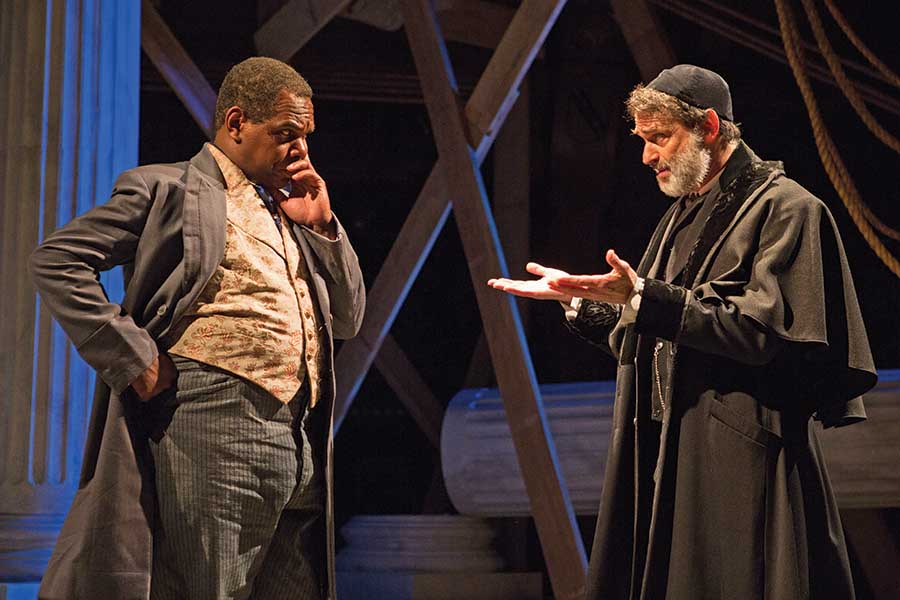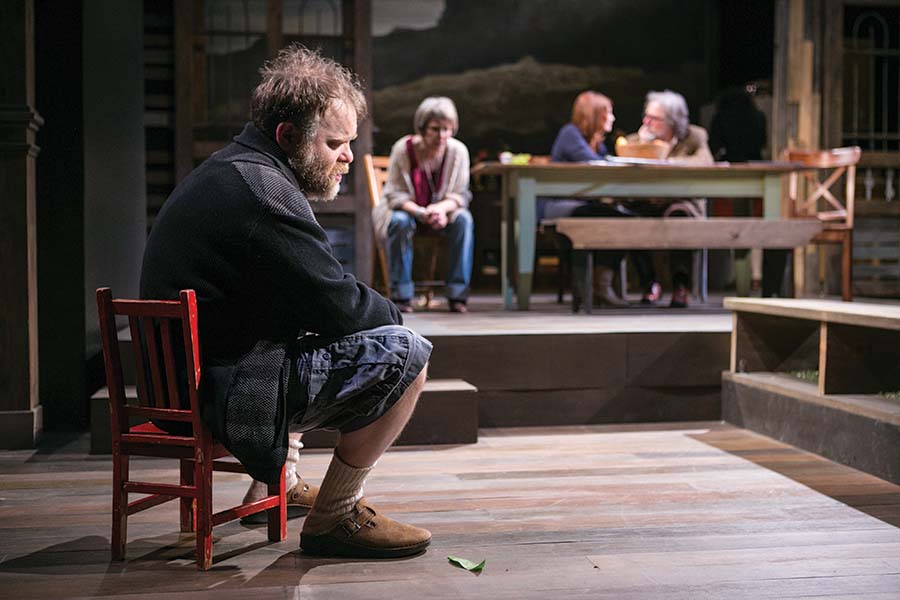We live in an era of specialization—of historic-crime podcasts and makeup-tutorial YouTube channels and novelists who focus on young-adult paranormal romance. But Aaron Posner, for his part, feels no need to narrow his scope.
“I have at least three or four lives just in the theatre,” Posner says with satisfaction, speaking of his careers as playwright, adaptor, sometime company leader, and acclaimed director in the Washington, D.C., area and beyond.
The American theatre is capitalizing on Posner’s varied talents this season. For instance, Philadelphia’s Arden Theatre Company is currently showcasing his own production of Stupid Fucking Bird (Sept. 15-Oct. 16), the lovingly impudent reinvention and modernization of Chekhov’s The Seagull he wrote in 2013 and which was one of the most-produced plays of the 2015-16 season. The staging at the Arden, of which Posner was a cofounder, marks the first time he’ll direct the award-winning play himself.
Meanwhile across the country in Costa Mesa, Calif., South Coast Repertory is mounting District Merchants (Oct. 2-23), Posner’s reimagining of The Merchant of Venice. A tale of racial and cultural tensions in post-Civil War Washington, D.C., the play premiered this past summer at D.C.’s Folger Theatre, where Posner often directs.
Oh, and that’s not all: Life Sucks, Posner’s riff on Uncle Vanya, is running at Lookingglass Theatre Company in Chicago (Sept. 9-Nov. 6). In spring 2017, D.C.’s Studio Theatre will present the world premiere of Posner’s latest Chekhovian homage, No Sisters. Produced in association with New Neighborhood, No Sisters is engineered to share a company of actors with a Three Sisters production at Studio, with many cast members performing in both pieces—in the same time slots but in different spaces in the Studio building. Posner is designing his script so that actors who are offstage in Three Sisters can pop into a parallel story in No Sisters, somewhat as performers do in Alan Ayckbourn’s double-sided House and Garden.
District Merchants and the Chekhov reinventions are examples of what Posner calls his “irreverent adaptations”—a brand of script he started writing relatively recently. The “reverent adaptations” he authored earlier in his career still have life: For instance, his hugely popular versions of Chaim Potok’s The Chosen (jointly adapted with the book’s author) and My Name Is Asher Lev are still popping up in season listings, including an Asher Lev this month at the Royal Manitoba Theatre Centre in Winnipeg, Canada. Counting professional and nonprofessional efforts, there will be about 50 productions of his plays in the U.S. this season, he estimates, noting that international stagings of Stupid Fucking Bird are also in the works.
Meanwhile, Posner is continuing his career as a director, building on a track record that’s taken him around the country and earned him major honors, including multiple Helen Hayes Awards. His production of Beckett’s Endgame runs through Oct. 16 at Spring Green, Wisc.’s American Players Theatre, while his D.C. commitments for 2017 include staging Albee’s Who’s Afraid of Virginia Woolf? for Ford’s Theatre and mounting Arthur Miller’s Broken Glass at Theater J.
As a director, the tireless 52-year-old is well known for riveting productions of the classics, including a 2006 Measure for Measure that mingled actors and puppets, and collaborations on Macbeth and The Tempest with magician Teller, of Penn and Teller fame (see AT “Sleight of Mind,” July/Aug. ’16). Posner “understands magic better than some magicians I know,” remarks Teller.
Posner is also an accomplished director of contemporary works. “Aaron brings to any production extreme clarity of vision—that is the thing that makes him a fantastic director,” says Ryan Rilette, producing artistic director of Round House Theatre, in Bethesda, Md., where Posner will stage Liz Duffy Adams’s Or, April 12-May 7, 2017.
What unites Posner’s disparate theatre activities is his ability to take text that is smart, canonical, or literary and make it arresting and luminously accessible. Take his A Midsummer Night’s Dream at the Folger this past winter. With a field of pillows standing in for the forest, a Puck (played by Posner’s much-lauded wife, Erin Weaver) who turned out to be in love with Oberon, and rude mechanicals envisioned as the denizens of a girls’ school, the production didn’t lack for surprises. But what most distinguished it was an ending that revealed the mechanicals as quirkily gifted rather than purely ridiculous. Instead of mocking the play’s lower-class characters, the climactic scene created a moment of poignant shared celebration for the mechanicals, Theseus’s entourage (seated in the Folger aisle), and the audience.
“The inclusion of the audience in the storytelling is a hallmark of the work that he does,” Arden producing artistic director Terrence J. Nolen says of Posner’s writing and directing.

For his part, Posner does not see his adapting and directing work as separate modes. Dramatizing a text “never felt very different from reading a Shakespeare play and saying, ‘How exactly do I want to make this live onstage today?’” he says in an interview at a café in D.C.’s Maryland suburbs, near where he lives with Weaver and their small daughter, Maisie.
Accessorized for the day with a sporty pork pie hat, Posner traced his writing and directing philosophies back to an encounter in grad school with the Hungarian-born director John Hirsch. Posner had grown up in Eugene, Ore., traveling regularly with his parents to see plays at the Oregon Shakespeare Festival—a formative experience, he says. Another vivid memory: playing Oberon, in a green raincoat, in an abbreviated Midsummer in fourth grade.
After majoring in performance studies at Northwestern University, where he met Nolen, his future Arden Theatre cofounder, Posner attended the MFA program at Southern Methodist University. There he worked as an assistant director for Hirsch, whose motto, Posner recalls, was, “Bring yourself to the work. Tell the truth about what you, uniquely, have to say to the work, in a way no other human being can.”
The conviction that any theatrical work is primarily intensely personal “is at the center of my work as both a director and a playwright,” Posner says. At the same time, he doesn’t believe in anything-goes idiosyncrasy. He’s wary of “falling into the trap of clever ideas over good ideas,” he says. An idea “can’t only be clever—it needs to actually be good!”
The SMU program proved the wrong fit for Posner, so he dropped out and moved to Philadelphia, where he, Nolen, and Amy Murphy founded the Arden in 1988. The theatre’s first show was Who Am I This Time?, Posner’s adaptation of short stories by Kurt Vonnegut. “Aaron’s interest in adaptation was a key part of our original work,” Nolen recalls.
Posner and Nolen initially handled the company’s artistic direction together. During that time, a Philly theatre acquaintance introduced Posner to magician Teller, paving the way for the pair’s future collaborations. After a decade on the Arden’s leadership team, Posner stepped down to become its resident director. Later he served for a time as artistic director of Two River Theater, in Red Bank, N.J. In 2010, he and Weaver, whom he’d met in Philadelphia, moved to the D.C. area. There they were part of the team that created The Gift of Nothing, a musical for young audiences that won a Helen Hayes Award after its 2014 premiere at the John F. Kennedy Center for the Performing Arts. Posner credits Weaver with some of his best ideas.
Though Posner has only lived in D.C. for five years, he’s become a beloved fixture of its theatre community. “He makes me a better actor,” says Holly Twyford, one of the area’s busiest performers and a frequent linchpin of Posner productions (she will play Martha in Virginia Woolf at Ford’s). Notes Twyford: “Where I can see two or three layers in a character, he can see six.”

Around the start of this decade, the germ of Posner’s first “irreverent adaptation” began to sprout in his mind. Over the course of his writing career, people had often asked why he only adapted scripts rather than creating them from new cloth. His answer had always been, “When there are so many great stories by true geniuses, like Dostoyevsky or Kurt Vonnegut, why would I want to bother the world with my thoughts?”
But as he grew older, he began to feel that he did have thoughts to share. One day he was talking with a friend about Chekhov, a playwright Posner loved but felt no itch to direct. He associated Chekhov with college, with work that felt too familiar and risk-free. When Chekhov wrote his major plays, Posner observes, “They were radical departures, and yet, because Chekhov has been imitated by virtually everybody for 100 years, what was once radical” now feels “safe and easily digestible.”
Making a wisecrack at the expense of Chekhov’s seeming tameness, Posner told his friend that he should really adapt The Seagull and call it Stupid Fucking Bird. Afterward he realized he hadn’t been joking: While he didn’t want to “serve Chekhov,” he remembers, he wanted to “engage with” and “re-radicalize” Chekhov, while also grappling in a personal way with the themes of love, family, and theatre itself.
He embarked on Stupid Fucking Bird “with no expectation that it would be produced,” he recalls, adding that he kept the profane title “as a challenge for myself”—a reminder to avoid second-guessing his instincts or worrying about offending people, but to “write the play that you want to write exactly, and don’t worry about producibility.” Throwing caution to the wind, he wrote a script whose riffing, vernacular language bears witness to the timelessness and universality of the emotions in The Seagull, while implicitly poking fun at our tendency to treat classic texts as sacred cows. With its break-the-fourth-wall moments and references to the modern theatre field and marketplace (“A play like this one with seven actors is practically un-producible,” said Con, Posner’s version of The Seagull’s Constantine, in the play), not to mention its acknowledgment of restless everyday experience, Posner’s play pulls its audience into a sense of community—a community that is of-the-moment yet also stretches back to its Russian origins.
Whether for these or other reasons, following its 2013 premiere at Woolly Mammoth Theatre Company in Washington, D.C., the play has landed on numerous professional and university stages. “I was shocked,” he confesses.
As with the case of the Chekhov remakes, District Merchants (a Folger commission) grew out of Posner’s fascination with a canonical script he didn’t want to direct. And here, as is his wont with irreverent adaptations, “serving the originating author no longer has any part of my consciousness,” he says. “I am now borrowing the bones of previous works, stepping into the playgrounds created by the other works, and sharing things that are important to me.”
As the interview wrapped up and he headed back to his busy slate of projects, it was easy to imagine that, in a sense, Aaron Posner has made the entire American theatre his playground.
Celia Wren is a former managing editor of this magazine.
A version of this story appears in the October 2016 issue of American Theatre.


